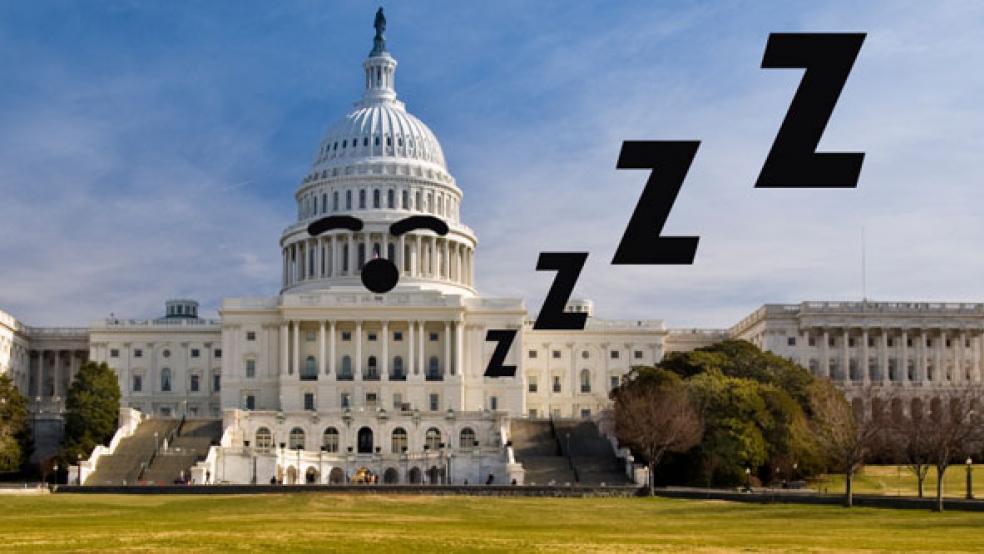With the addition of Wisconsin Rep. Paul Ryan to the Republican presidential ticket, President Obama has increased his criticism of the do-nothing Congress, as the country confronts its high unemployment rate, the recession-inducing fiscal cliff at year-end, and a drought that’s ravaging farmland.

“He’s one of those leaders of Congress standing in the way,” Obama said of the GOP vice presidential candidate during a Monday speech in Iowa. “So if you happen to see Congressman Ryan, tell him how important this farm bill is to Iowa and our rural communities. It’s time to put politics aside and pass it right away.”
Republicans counter that the attack is merely an attempt to deflect the challenges raised by Mitt Romney over the president’s economic stewardship. And Obama can’t lay all of the blame for inaction on Republicans, since his fellow Democrats control the Senate.
But it’s unfair of Obama to brand lawmakers the “do nothing Congress. After all, Obama and Congress have accomplished a lot in recent months: They’ve named a bunch of federal buildings.
Of the 65 bills that cleared both chambers this year, 19 – or about 30 percent – attached someone’s name to a government office building. Over the course of the 112th Congress that started last year, that would be slightly more than one out of every five bills that Obama signed.
“They [the bills] stand out this year because little else got done,” said Thomas Mann, a senior fellow at the Brookings Institution and co-author of the new book, It's Even Worse Than It Looks: How the American Constitutional System Collided with the New Politics of Extremism. “And that, in turn, is a result of divided party government at a time of deeply polarized parties engaged in a permanent war. Only the public can change the situation.”
Asked what political benefits the lawmakers receive from shepherding these prizes to the president’s desk, Mann replied, “Little. Makes the family and friends of the namee happy.”
Mann’s co-author, Norm Ornstein, a resident scholar at the American Enterprise Institute, said that naming ceremonies do little to draw votes but may solidify a lawmaker’s base of support. “On some occasions,” he said, “you may do it for a predecessor, and that increases the possibility that some day down the road, there will be one named after you.”
AND THE HONOR GOES TO …
At a time when the U.S. Postal Service is imperiled by falling revenues and mounting retiree benefits, it’s not too shocking to learn which agency is the most popular recipient of this honor. The Postal Service, which last week reported a $5.2 billion loss in its third fiscal quarter, supplies a $250 plaque for each re-christened office, said spokesman David Partenheimer.
Most branches are named for local heroes and public servants, but celebrities who’ve recently received the tribute include Ronald Reagan (three times), Jimmy Stewart, Bob Hope, Cesar Chavez, Nat King Cole, Frank Sinatra, Walt Disney, and Jay Hanna Dean (i.e. baseball pitcher
“Dizzy” Dean).
The current batch of lawmakers have passed 147 measures this session that became law, compared to 383 in the previous session – 20.8 percent of which renamed offices – when the Democrats also held a majority in the House. In 2007 and 2008, the 110th Congress forwarded 449 bills to a lame duck George W. Bush, of which 32 percent stuck a new plaque onto an old building.
During the end of the Bush presidency, Republican lawmakers criticized the Democratic majority for the same kind of shenanigans.
“Almost every morning, I talk to my parents who are both in their 80s and are very inquisitive about what goes on in Congress,” Rep. Ted Poe, R-Texas said in a July 14, 2008, floor speech. “Today, like most Mondays, I tell them we are working on postal legislation. I don’t really go further and tell them the legislation is actually just naming post office buildings throughout the vast plains and prairies of America. After all, we have named 72 federal buildings this Congress.”
Among the 48 bills sponsored by Poe in this session, there’s a measure to name a post office in Crosby, Texas, after Army First Sgt. David McNerney, who won the Medal of Honor during the Vietnam War. The bill passed the House shortly before the August recess and awaits Senate approval.
And in some cases, when a recipient is deemed politically divisive, there is the need to compromise in order to form a bipartisan consensus. The House voted in 2011 to rename the U.S. courthouse in Midland, Texas, after presidents Bush 41 and 43.
Sen. Barbara Boxer, D-Calif., introduced a measure in June to bestow this honor onto a family demonized by many of her fellow partisans – but the bill requires that the Environmental Protection Agency’s headquarters become the “William Jefferson Clinton Federal Building” and that the D.C. offices housing the Bureau of Alcohol, Tobacco and Firearms be named after the untouchable Eliot Ness, who took down Al Capone.
The naming trend is not likely to stop, said Richard Baker, the Senate’s historian emeritus. Lawmakers are eager to leave their stamp on the county, no matter how modest it might be.
“Look around Washington, D.C.,” he said. “Naming is sort of in the genetic code of members of Congress.”




